Text
That was a great post to end the semester! I really liked that you compared the two sisters and two cities. I think the two of them seemed ‘evil’ at first but they both had a different side to them. In the end it seems like everyone grew and learned throughout the film. I loved all the character development! I also hope you get to make an animation film in the future. Wishing you well:)
Spirited Away and Goodbye
I love this movie. I have a fascination with animation. While watching this film, my love for animation was reassured. The bright colors, magical characters, and consistent pace of the film were just some of the factors that made this film a hit.
Everything happened so fast. One moment Chihiro is with her parents wandering in an “abandoned amusement park” to then a contract bound worker at a spa house for unimaginable creatures.
Her named is change to Sen and she begins to forget who she is. That is how one would get trapped in this world, like Haku. It is Chihiro’s kindness and selflessness that saves her. She does so many wonderful things for different people on accident. She frees that dragon that was trapped in all that muk. She saves Haku when he is a dragon. She takes Boh on the greatest adventure of his life by simply taking a train. She helps Haku remember his name by the power of love. She finds No-Face a home.
I believe that this film resonates more with Japan. I am not fond of Japanese culture, legends , or stories so I could be assuming completely incorrectly; but; the film definitely deals with Japan’s complex cultural identity.
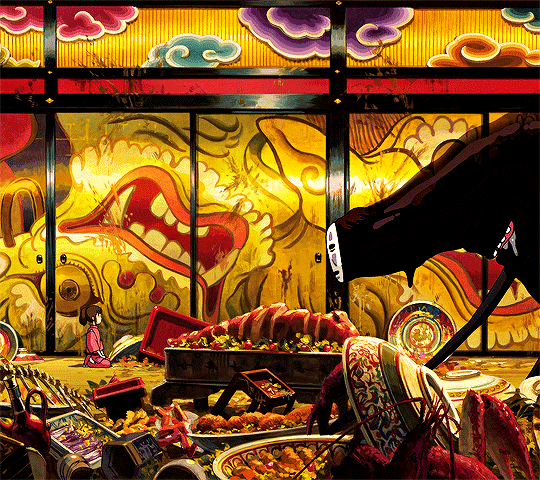
Man, I am so tired. I wish I could be “Spirited Away.” I think about what I would do if I was in Chihiro’s situation. I’d probably get turned into a frog. The film touch many genres for it was funny and scary at time. No-face creeped me out but now I get the references from all the memes about him. I thought the use of two identical witches was genius for it changes the perspective of leadership. In one “world,” its busy and chaotic. Hustle and bustle with a grumpy, mean boss. In the other “world,” with the nice sister, its relaxing and welcoming. Like the lantern even waved goodbye when Chihro and gang were leaving. It reminds me of Good Witch, Bad Witch.
All in all, great film. I hope to create an animation film like that in my lifetime. This being the last blog post for this class (and me needing to reach that word count) I would like to take this opportunity to say goodbye. This has probably been my favorite class in my entire college experience. I graduate this semester so this is it for me! Not only has this class been valuable and benefitting my interest towards Japanese, I have met so amazing individuals and these are the people I wish I had met earlier. Thank you classmates and thank you professor for a class I will forever cherish.
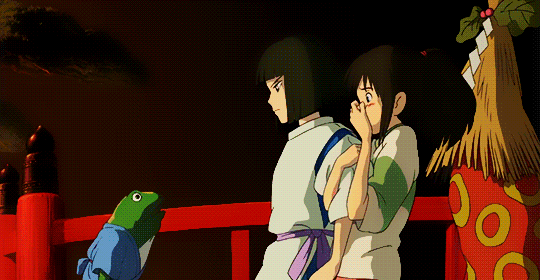
1 note
·
View note
Text
'Spirited Away'
Wow. Spirited Away was definitely the best way to end this class. I’ve heard of this movie for a while and it’s been one of those films I’ve always wanted to see but never did. I’m really glad I got to see it now. From what I’ve heard and from the posters/pictures I’ve seen I thought the film was going to be really sad. As in dealing with death and grieving, given the name. I’m glad it wasn’t that but there were still definitely moments that pulled at my heartstrings. The biggest part was probably the ending where Haku says he’s sure he and Chihiro will meet again. The scene is beautiful and the music is uplifting, but I still feel like it is more likely that they won’t actually see each other again because they are from different worlds. And Haku isn’t even human to begin with so even if he were to leave he won’t be going back to the human world with Chihiro.
No Face was a character I had seen a lot of pictures of and was the most familiar with. I really liked him when he showed up and how his silent presence was what got Chihiro to leave the door open for him. I thought he was gonna be the one to come in and save Chihiro so I was definitely not expecting him to eat the frog. It was very interesting because the audience saw him eat the frog while everyone else was unaware of this. They were praising him for his ability to generate gold when the audience knew there was something terribly wrong with him. When Yubaba was dealing with him in the room and we only heard their voices, I thought the way she talked to him sounded so much like when she talked to Bo, her baby. It’s worth mentioning because I think No Face is similar to Bo in how they both don’t know where their place in the world is and are unhappy and lonely with where they are. When No Face was saying “I want Sen” followed by “I’m lonely” I thought I heard very similar words with those two sentences. I don’t know Japanese so I could be wrong but if they were really similar sentences I would admire the writers so much for that clever play on words.
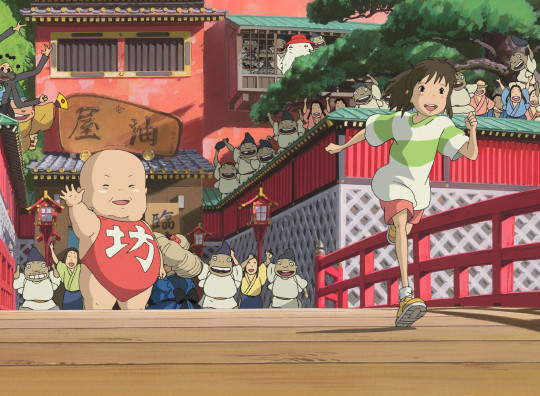
From the beginning of the film, we see that Chihiro was very upset about having to move and didn’t think she’d have anyone in this new town. Through her journey of fighting for the people she loves she grows tremendously. I think everyone else in the film also went through a similar journey of finding a place for themselves. Haku learned who he was, Bo learned to stand up by himself, No Face found his purpose, and Yubaba understood that her power wasn’t everything.
I think there are still so many more details I’m probably and I’m definitely going to watch it again to absorb the beautiful story and animations.
0 notes
Text
I also felt similarly that it was hard to keep track of the characters. I was very confused at the end when one of the natives saved Ruriko and there seemed to be a romantic connection between them. I don’t know if I completely missed that or if was really a new information given to us just then. I also agree that the language really threw me off. I liked that they were trying to create a new film style but it definitely made for a challenging watch.
Sukiyaki Western Django - (JPT3391)
Sukiyaki Western Djangofeels like the movie that happens when you lose a bet and the penalty is you have to make a movie BUT it has to star Quentin Tarantino.

For as simple as I think this movie is supposed to be, I had a difficult time keeping up with the characters aside from their allegiance to the Genji and Heike clans, which was usually obvious enough through their clothes as to not bear mentioning. Other than that I had a difficult time keeping tabs on everybody until later in the movie, at which point most of them were dead so it’s kinda a moot point. Also I wasn’t able to keep tabs on the sheriff very well sot it felt like he came out of nowhere in the final fight scene.
Carrying that into action, I feel like the action scenes were the best part of the movie. For the most part the action felt kinetic with shots and brawls appearing from many different angles so you don’t feel like the action is restricted to a single plane. The action is a bit campy at times; I don’t care how strong you are, nobody can carry a Gatling gun like that, but I don’t think that overall detracted from a good set of scenes and about the only part of the movie I remember with any fidelity, a criticism that overshadows most other impressions I had walking out of this movie.
I had to actually think about what to say about the choice of making the entire movie English here. Because calling that out on principle for not being the native language of the audience draws an obvious parallel to how we’ve spent an entire semester watching movies in Japanese with subtitles, and I’ve also spent a good portion of high school and college watching anime with subtitles as well, so I can’t criticism it purely on not being in the language of it’s intended audience at home. However, considering that farther, when we’ve watched movies in Japanese it’s been from people who are mostly native speakers or otherwise well versed in the language, so even if I can’t understand the words they’re saying, by reading the subtitles and hearing tone I can get a very good idea of the character’s intent in that moment. Instead of conveying strong tone and emotion, lines here frequently feel disjointed. Of course, I had an enjoyable time watching anyways and frequently the room burst out laughing, but I feel like the enjoyment I had was either the campy action scenes or laughing at the delivery of voice lines. This does help serves the movie’s campy-ness in a way but I think it also leads to the movie’s biggest fundamental flaw.
Through Miike’s choice to have the entire movie in English, the audience is divested from the movie’s plot and characters. I’m gonna compare the movie to the room here in that this is a movie that’d honestly be depressing to watch alone and who’s only enjoyment is from a room full of people to laugh at it with. Of course there’s a place for movies like this, but I got the impression that the movie was trying to do more than that with the characters it set forth as otherwise there’s a lot of wasted effort that doesn’t serve to make the campy movie we all enjoyed at the viewing session. The disjointed experience created by setting the film’s language as English, Sukiyaki Western Django squanders it’s potential to exist as both a fun self-referential parody of western and samurai movie tropes AND a compelling story in it’s own right and instead chooses to exist as a good joke, but not something worth watching for it’s own sake.
1 note
·
View note
Text
Sukiyaki Western Django
I was very, very confused throughout the film, but I still enjoyed it. First of all, I have never seen a film where the entire cast is speaking only in a language that isn't their mother tongue (with the exception of Tarantino). I can't help but compare this aspect of the film to Swallowtail Butterfly. However, while Swallowtail Butterfly's non-Japanese speakers were raised out of Japan, all of the characters here are meant to be Japanese, or at least that's what I assume because they have Japanese-sounding names. They also incorporated Japanese tales into the plot. Why, then, were they using English?
We've discussed a lot in class about how the "New New Wave" of Japanese cinema were making films that were aimed at receiving international acclaim. Although the film is perhaps not the typical festival-winning film style we are used to, the fact that they could put together a fully English-speaking film showcases their ability and universality of the Japanese film industry.
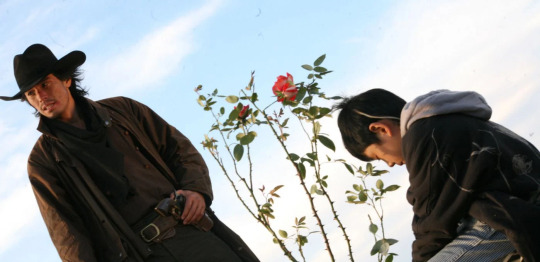
I’m not familiar with Westerns, Django, or Tarentino at all so I don’t know for sure if the film would have been easier to understand for those who did. But like I said before, whether or not the film was successful in making a film of its genre (Western/drama), its innovative ideas and commitment to the idea throughout is something to applaud. Like my classmates, I couldn’t tell if the film was trying to be serious or if it was self-aware of its ironic take the entire time. I find it hard to believe that the film I’m watching isn't a dark comedy when a guy’s head is cut open and he continues to clap his hands over his heads. Gunshots, stabs, and bleeding all follow a different biological rule than the one in our reality. However, any scene involving the son would draw me back in again. The fact that a child had to see and hear both his parents die horribly seemed like a plot that was too traumatizing to be put in as a mere comical scene.
Perhaps the film was trying to do both by telling the American Western story through the lens of a Japanese—someone who is an outsider. Elements like dragged out dying moments and amazing tricks with guns are things I associate with American westerns. These things aren’t realistic, but they’re filmed in a way to make us suspend our disbelief and enjoy them on screen. Sukiyaki Western Django, however, challenges us to see the ridiculousness of these classic film elements, yet asks us to appreciate them at the same time. It seems to be a great blend between the cultures that results in a uniquely wild product of entertainment.
3 notes
·
View notes
Text
Wow! That analysis was on point! I think you really were on point when you said this is a film discussing the interiors and exteriors of people and places. I also noticed the importance of nature in the film. At the end when reading Tokue’s letter she talks about how she saw the sad gaze in Sentaro’s eyes which remained all throughout and especially when Tokue passed away. Afterwards, however, when Sentaro was selling dorayakis out in the open his face was completely lit up. I definitely agree that he was connecting to Tokue through the nature. Also, he was giving happiness to people and receiving it as well. It was a really beautiful film indeed.
Sweat Bean
I absolutely loved this movie, it has such a simple but heartfelt story with gorgeous scenery and shots sprinkled throughout the story; ngl I cried for the entire last 30 minutes of this movie.
I think that the main message of this film is that you have to look beyond the surface of things or rather look into something in order to understand and appreciate it; I would describe this film as a story of interiors and exteriors, that are seen in both people and places. This idea is first expressed in the dorayaki itself, as it is only once Tokue uses her An in the dorayaki that Sentarô actually enjoys it.
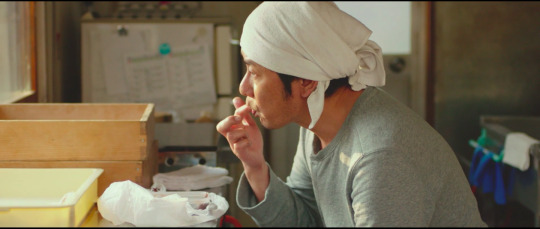
Of course the film then shows that gaining a better understanding of things is not always easy, as Sentarô and Tokue have to rise early and spend hours preparing the An. However, this process is what allows Tokue to impart her ideas of stories to Sentarô even if he doesn’t realise it a first.
The other way that the film explores this idea of interior and exterior is through Tokue herself. Although the only part of her appearance that is physically changed by the leprosy is her hands, she is still discriminated against and literally cast out from society. Yet despite this, she is a very kind and caring person who holds no anger towards the world or society. Similarly, the neighbourhood in which she lives is given negative connotations because of the people living in it, yet it is arguably one of the most scenic locations in the film.
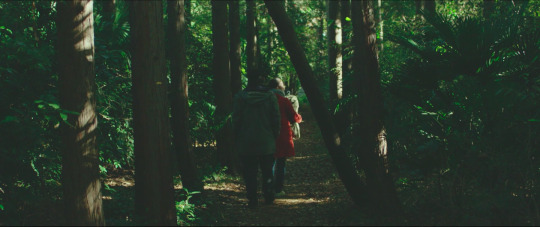
It is interesting, that this is the only place in the film that is dominated by nature rather than by the city. Perhaps this is done to highlight the way Tokue is more in tune with nature than the other characters, as she weaves stories from all parts of nature. I think this also links with her ability to see into people as well, as she did with Sentarô, she empathised with him and saw that he had a story to tell.
Sentarô’s decision to leave the shop and have is own smaller stand is not only a way for him to escape his situation and the interior he was stuck in but also as a way to find his passion for dorayaki and become closer to Tokue. It is significant that his stall is outside, as it shows that he is now free from his burdens and is able to tell his own stories now.
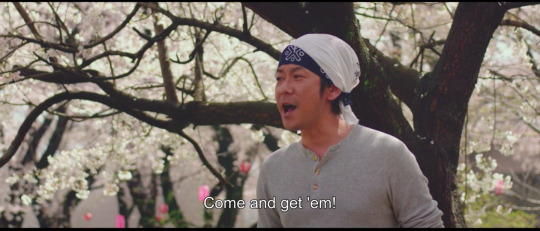
4 notes
·
View notes
Text
Sweet Bean
I expected the film to be like Tampopo but this was not that at all. It was really sad. I thought Tokue would be a lady who used to work in a dorayaki shop that wanted to pass on her knowledge of making wonderful dorayakis to the next generations. I had never heard of leprosy before this film so I had to look it up in Thai and I found that it was a condition I had heard of but didn’t know much about. What is interesting is that the literal translation for leprosy in Thai is ‘disgusting’. Considering how the people with leprosy seemed to be treated, this was a sadly accurate name for how they were perceived. What is horribly ironic is that, according to Google, leprosy is actually very treatable nowadays and is not even very contagious. It’s not passed on by touch and it seems to be from repeated and long-term contact. However, the patients in this film had to have all their possessions disposed of and they were not even allowed outside of the facility. That is absolutely wild to me. It seems that there is also a tie between leprosy and Buddhist beliefs that say leprosy is the result of wrongdoings one has committed and been punished for. Even though the film didn’t touch on much of the historical facts about this situation, it opened up a whole new perspective by telling the story from how people with leprosy are adapting into society today. The film came out in 2015 and although these practices of treating patients with leprosy doesn’t seem to be present anymore, there is still such a strong stigma against it.
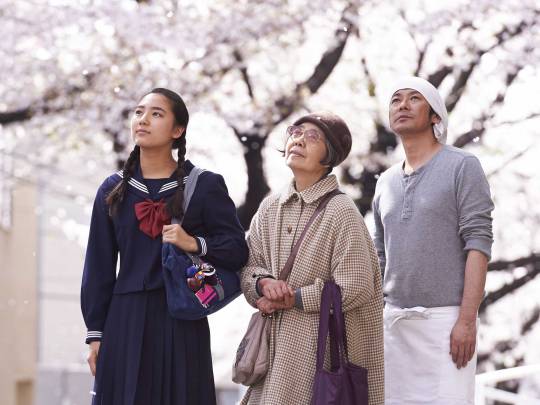
Tokue was such a wonderful character. I loved how passionate she was about making dorayaki and how respectful yet stubborn she was about working in this shop. She made sure to bring her paste in case the boss rejected her from the job again and forced it into his hands before running away. I also liked the dynamics between the three generations, Tokue, Sentaro and Wakana. Because of their ages, I thought of them as a family of grandmother, son, and granddaughter. Since all of them have either left or been left by their blood families, they found each other and connected through their passions and pain.
Another aspect that I really loved was how Tokue talked about everything around her telling stories. Although it doesn’t seem possible, it makes sense that she would become incredibly perceptive of her surroundings after having been stuck in the same place for so long. She would have had to find ways to make sense of her life and perhaps connecting with nature was what made her experience bearable.
0 notes
Text
Wow! I love the connections you found between colors and the themes. The only thing I noticed about colors was how the film had a very strong green color correction. To me it felt very much like something rotten was happening on screen. But I think all your examples support your point really well. Great analysis!
Pulse
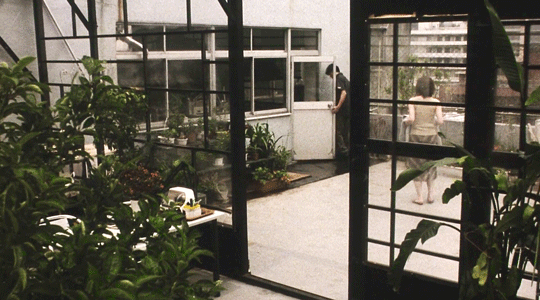
Colors & The Garden
The movie relied heavily on it’s selective use of colors to allow the audience to learn more details about what was occurring with each individual in the film, which later becomes apparent as an even larger symbol having to deal with plant life.
First the movie starts off in a garden, as the protagonists are surrounded by green. In this color they are healthy and undisturbed. However, when the first victim disappears we see a shift in all of the character’s clothing to yellow. Each person has at least some form of a yellow garment or accent that they wear showing that something isn’t quite right - no one is as healthy as they were before and they are showing warning signs of distress much like plants do. After the second victims death, the character’s accent colors shift to orange showing that they are moving forward on the process of becoming dead (much like fall leaves). Anytime a character is on the last scene or day before they go to the forbidden room or they have an experience with the ghosts, they will have red accents. When the lead female protagonist discovers the red taped room but does not enter, she is seen as having red shoes. Meanwhile, her friend who busts in there sports an entire red dress.
Once a character has gotten to this point, there are a few possible ways they could go, depending on how they handle their interaction with the supernatural. In the case of the male botanist, he becomes instantly possessed and only wears dark grey and black until he eventually fades out of existence. Whenever a character is possessed by a spirit in this film they wear dark colors or all black. Yet in the case of the female friend, she goes through a state of panicked behavior which has her dressed in white as if she were an empty shell of herself - the transition from the empty white to the possessed black shows that the spirit has filled her empty shell.
Kawashima is an interesting character for these color analysis points since he at one point wears green on yellow on red to show that he is rapidly changing between phases. Likewise, the computer research lady also shows early hints at being connected to the supernatural through her black and white dotted dress - a direct reference to the dot screensaver shown in the film that also ties to her feelings of emptiness that she believes can only be filled by the supernatural.
Metaphors
Overall, I think that this film is very clear about the message it is trying to convey. Essentially the movie is about how people use the internet as a medium for connection, but this does not actually connect them and instead makes them more lonely. The movies end seems strange, but is it simply trying to show what would occur in this theoretical world where everyone only connects through the medium of technology, leaving behind those who do not join the global rise of the internet. I think this message definitely dates the film, but I can see how at the advent of the internet such messages and ideas most have been very prevalent (and still are to some degree today). While I think the movie paints quite the extreme, it is best to use the internet in moderation and to not miss out on in-person personal relations as I’m sure we all learned during the pandemic.
2 notes
·
View notes
Text
'Pulse'
This movie was really creepy. I found the ghost scenes to be much scarier than Ringu, although I didn’t necessarily like Pulse more. The one scene that was the absolute creepiest to me was when Yabe entered the Forbidden Room and the ghost lady started walking to him. There weren’t many grand special effects (that I could notice) except for when it cuts between her movements, but the way she moved her body and the unsettling facial expressions made me absolutely terrified. I really applaud the whole production team for their cleverness in how they decided to direct their ghosts. I also noticed that while the ghosts had similar cuts between their runs, they looked quite different. The ghost lady that scared Yabe looked almost like a real human, while the ghost man that scared Kuwashima had fuzzy outlines like he was a character modeled on a computer. What was similar between the two was the closer they got to their human’s faces we could see their faces clearly and with more expressions.
I think this might be related to the dot experiment we see in the beginning. Harue says that just like people, if the dots come too close together they will be separated, but if they are too far from one another they will be brought closer. Perhaps the way technology has developed has led humans to become too close yet too far from their inevitable death. They are too close because the discoveries in science and technology always aim to investigate the next mystery in the world, one of which is death and the afterlife. They are getting too close to the concept of death even while they are alive. However, humans are also too far from death because of their belief and faith in science and technology. Like Kuwashima, some people believe that we will eventually find a way to out-run death, and therefore don't even acknowledge death. Although there is still so much to unpack, I think Pulse had very little to do with actual ghosts and much more to do about humanity today.
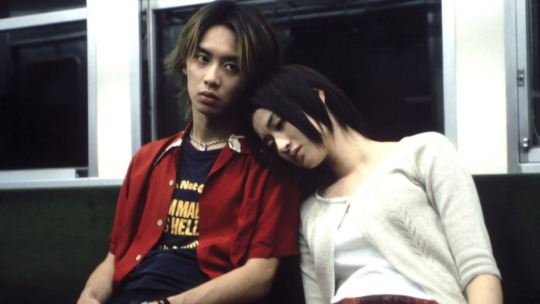
Watching the film 20 years after it first came out has also allowed me to compare it with more recent works. First, I felt that the people dying one by one until only a few were left reminded me very much of zombie movies because the deaths were treated like an infection. It spreads between people and only a few survivors are left. One other specific work Pulse made me think of was Alice in Borderland. Alice in Borderland is a series (adapted from a Manga though I have never read the manga) about teenagers who randomly find themselves in a completely empty Japan where they must play life or death games to survive. The emptiness of the city along with the unexplained reasons for where all the people went were some of the similarities between the two works. They both commented on societal values, beliefs, and the growth of technology.
0 notes
Text
Wow your blog post was fun to read. I could feel the frustration through the screen! Although I did not dislike Asakawa half as much as you did, I definitely agree that she made some frustrating decisions. I was especially annoyed when she traveled to the cabin alone and FELL ASLEEP in there, knowing something was very wrong about the place. I get that characters have to make some frustrating decisions in order to drive the plot for horror films. What I absolutely couldn’t get behind, though, was how reckless she was being considering the fact that she has a son to think of. She seems to really love her son and prioritize his well-being over anything else, so it really didn’t make sense how she could just go on this investigation without thinking about the consequences that would come.
Ringu - Nakata
Ringu is a horror/thriller film from 1998 directed by Hideo Nakata. From what I’ve heard about it before watching it’s one of the big horror movies, and is generally regarded as a must see. I’m not a huge fan of horror movies myself, I tend to find them a bit silly and the protagonists tend to always make really stupid choices. Wow was this movie no exception.
I was bored for the majority of the runtime of Ringu. I couldn’t get very invested in the story for some reason. This may be because it is such a famous movie I already knew the general plot or it may be because I hate the characters. For real, Asakawa really made me hate her so early on and so easily. I get it, she’s a journalist and she wants to find out about this mysterious tape that killed her niece. So what does she, the single mother do? She watches the tape that killed her niece. How dumb are you? In my opinion, even if you don’t believe in superstition, that’s dumb as hell. After that, what does she do? Shows it to Takayama. Why? They want to solve the case, but I just can’t get over how dumb this is. The final nail in the coffin was the fact that she just left his tape lying around the house apparently? Like, dude, you have a CHILD. I’m starting an Asakawa hate group, you’re all welcome to join.
I thought the flashbacks and Takayama having some weird PSI powers was strange, but it didn’t take me out of the movie. If there’s a killer tape with someone’s rage trapped in it, I guess I can believe that people can have psychic powers. After all, that’s kinda what got the Shizuko and Sadako in their situation to begin with. The flashbacks themselves felt kind of weird, especially since Asakawa seemed to get transported into them instead of them just seeing them, but this wasn’t a major issue for me.

One thing I really didn’t get was the point of the whole “storm keeping them on the island” plot line that lasted for a total of 3 minutes, had no real impact, and just kinda felt like a filler bit. Yeah, I guess it showed the old mans change to be willing to help them, but like, ultimately it did nothing different then if they had just left easily.
I do want to say that the scene with Sadako coming out of the TV was actually pretty good. It looked pretty good and was definitely creepy. But this also leads me to what I think was the ost annoying and frustrating thing about this movie as a viewer. Earlier in the film Asakawa interviewed a few young girls about the tape. We get some basic information about what happened and that’s it, not much we as an audience didn’t already know. HOWEVER, apparently there as more information that she got that we just didn’t, and it plays as voice over at the end when Tamayaka dies. It mentions that the only way to get rid of the curse is to copy the film and have someone else watch it. So it’s implied that ASAKAWA KNEW THIS? One, wtf, that feels like such a stupid copout. Two, Asakawa is an idiot. Three, now she’s gonna go kill her dad, so that’s fun.

Ultimately, I think if I didn’t hate the main character I would have enjoyed this movie. I just felt it was boring and since I didn’t care about Asakawa I couldn’t really get invested. The very beginning of the film was good, so I’m really thinking the character issue is what killed it for me. At least the movie looked nice from a cinematography standpoint.
4 notes
·
View notes
Text
'Ringu'
I really enjoyed watching Ringu. I’ve heard about this film since I was a kid. I remember it was very popular in Thailand and all the older kids would tease the younger ones that if they turn on the TV at night alone they’ll see this cursed video. I hadn’t seen it until now and I think partly it was because I was quite scared of the stories I had heard of as a kid. It was scary but not as much as I thought it would be. This wasn’t a bad thing, though. I still think the movie was incredibly well done and what ended up being the scariest thing was the reality that this haunting curse was never going to go away.
The film kept me on edge all throughout even though there wasn’t a high number of jump scares. It felt very quiet and beautiful. The cinematography was well designed to give the film an eerie yet realistic vibe to it. I like the dynamic between the main characters a lot as well. I appreciate that they didn’t try to have the two of them get back together over their shared trauma from this event, yet they could still care for one another and their son. I think that was a very realistic portrayal of modern day families. The son was also such a great character. His acting was so good. Even though he didn’t have many lines, when he would stand quietly I’d get so creeped out but at the same time drawn to look at his expressions.
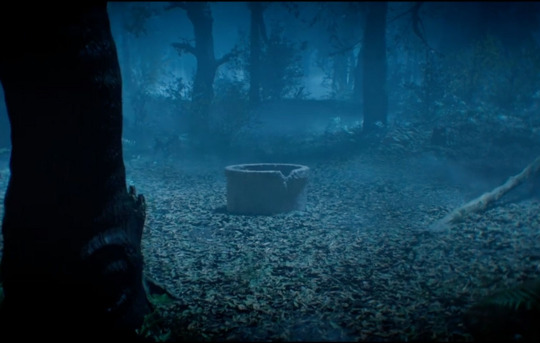
Having grown up with Thai horror films, I see where some of them have taken inspiration from Japanese films like Ringu. The storyline that relies on an investigation of someone who is somehow involved in these mysterious sequences of events is something I’ve seen in a few other movies made after Ringu. I think it really speaks to the success of this film and techniques used.
Thinking back to other films we’ve seen, though, the fact that Ringu’s ghost comes about from technology (TVs, phones) reminds me of Morita Yoshimitsu (Director of Family Game) who went on to make films that commented on the horrors of technology. I think Ringu makes a subtle comment on this because even though Sadako was left to die in the well, it wasn’t until the cabin was built with the TV and phone that she started this curse. Considering the fact that Japan today is an incredibly tech savvy country, I wonder what the opinions are like nowadays on the effects of technology.
0 notes
Text
I completely agree that it felt like the film was really juggling a lot and there could have been some interesting points to tackle if they included Ryo Ranki more. I didn’t understand why Ryo Ranki didn’t try to go find Glico when he found out she was a famous singer. And also at the end when Ageha gave him the cassette, I was confused why nothing happened afterwards. But perhaps there was a reason why it happened.
Swallowtail Butterfly - Shunji Iwai
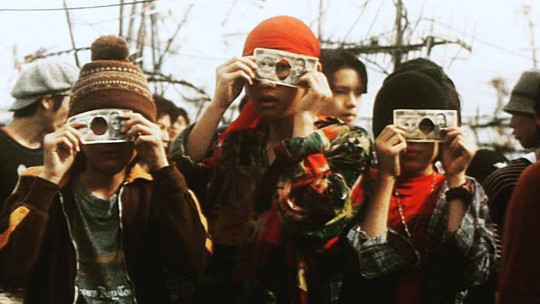
Swallowtail Butterfly by director Shunji Iwai was an interesting movie to watch, it had many aspects that I was a fan of and other parts of the film I was just a bit confused by. I think most of the confusion stems from the fact that the film appears to have so many different plot points that putting it all together took some effort on my mind. There was the obvious main plot
of Glico and Ageha and the bond that they built, both coming from what seems to be difficult pasts. However, throughout the film there seems to be other plot points which carry the same amount of importance which made the movie seem like it had multiple genres all at once. There was the journey of Ageha and Glico, then there was the band that was built which made Swallowtail Butterfly appear to be one of those films about a band going through the trial and tribulations that bands go through, and then there was the Yakuza like issues when it came to Ryo Ranki in which I felt was never really touched up on. It was clear that there were these groups of gang members who really wanted this cassette that had this tape which allowed them to make counterfeit money but I would have liked to see Ryo Ranki have more time in the film and maybe a scene where he connects with the rest of the cast.
A major part of the film that I found really interesting was set in this near future environment where it seemed there was a blend of cultures all placed in Japan. I thought it was really interesting how it seemed the general consensus was that English was spoken by everyone so there could be a means of communication between everyone. I will say I think this made it a bit harder for the actors to act a bit more naturally. I don’t think the acting was bad at all by anyone but I did think there may have been a few moments where they came off a bit awkward, but it was mostly due to the language. This is totally fine of course, speaking a non native language is already not an easy task so I can only imagine having to juggle acting and speaking in a different language is not any easier.
Overall, I was a fan of the film. I don’t think it was very difficult to follow along and I for the most part understood the key moments of the film. I just did have moments of mental whiplash when the movie seemed to be juggling more than one identity when it came to its genre.
3 notes
·
View notes
Text
'Swallowtail Butterfly'
Swallowtail butterfly is a very unique film. I really enjoyed watching a Japanese film that incorporated many different cultures and languages into one film. I thought all the characters had such unique personalities, characteristics, and ambitions. I thought it was incredible that the film decided to focus the story on main characters who were all of lower social classes, both because of their finances and because of their races. It wasn’t only reflective of the conditions of Chinese immigrants in Japan, but it was a story that was inspiring for anyone struggling to find their place in society and have their dreams realized.
Ageha and Glico were my favorite characters in the film because I really admired their individuality and fight for their survival. Ageha’s life under the care of her mother was incredibly sad. The fact that she managed to survive throughout all the years that her mom didn’t properly take care of her and still had a drive to strive after she met Glico was amazing. As for Glico, she was a prostitute that had gone through many adversities that she had accepted her unfortunate fate. Glico and Ageha’s dynamic is so mesmerizing. Glico didn’t want to take care of Ageha at first but I believe she saw something in her that reminded her of herself which is why she decided to take her back after selling her away. The tattoos that each of them has, to me, represents how they’ve found their own path to spread their wings and fly. The two of them changed each other’s lives immensely after having met. This is also reflected in the film’s anthem, My Way. Not only did Glico and Ageha figure out life in ‘their own way,’ but the rest of the group did as well.
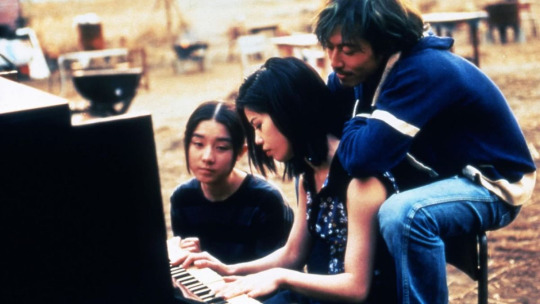
Another character worthy of mentioning is Feihong. I thought the actor did such an amazing job portraying him. His character was funny, sweet, intelligent, loyal, and overall entertaining to follow along. His fight for survival comes out in such a positive energy. He is quick to make friends and is very passionate about all the good things in life. I thought his character was the one to hold the whole group together because of his strong connection with all of them and specifically with them being ‘Yentowns.’ He was so proud of this that he wanted to start a nightclub with this name. His certainty in not turning the club into a prostitute also spoke to his love for his friends. His death at the end was definitely the saddest point of the film. He sacrificed so much for his friends and the dreams he wanted for Yentowns. It was also incredibly unsettling to see the police brutally beat him up to get their information. Even though this is a fictional story, I would have to think there was some truth to the reality of Yentowns’ lives in Japan that a situation like this could be portrayed so violently.
Overall I thought the film was amazing! I enjoyed following the characters’ journeys and I think it was such a refreshing style of filming and storytelling.
1 note
·
View note
Text
I really liked how you framed Nishi’s character throughout the film, especially towards the end. I also think he wanted to do things for the people who cared about. I think it also came from a place of overwhelming guilt. His life has had so many unfortunate events happened to him that no logic made sense anymore and he just wanted to pursue his last wishes before he committed suicide.
Hana-Bi
Hana-bi was the most action-packed movie we have watched. I was thoroughly enjoying myself throughout the whole movie. This movie felt like something my dad would watch with me. Nishi seemed like the classic silent yet strong character that every middle-aged man could fall in love with. He has a kind heart and a soft spot for his wife and partners. This is juxtaposed by his John Wick level of skill in taking down his foes. I enjoyed watching him batman his way through the Yakuza with ease. I was never really worried about Nishi when it came to facing the Yakuza.
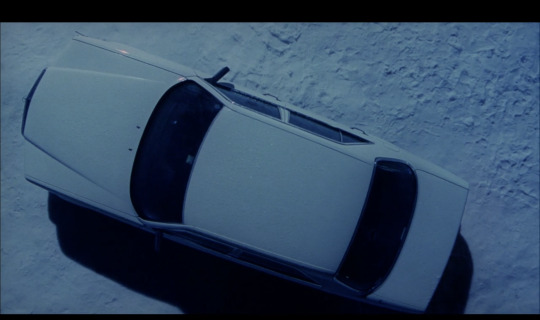
Nishi’s entire life revolved around his wife Miyuki. The whole reason he took the money from the yakuza was her. When it all failed it broke his heart, but he knew that there was nothing he could do. He was resolved to make some memories with his wife before she passed. However, the Yakuza couldn’t get off his back. Honestly, I felt that Nishi would eventually murder his way through the Yakuza. My only concern was why he didn’t do it earlier. It was a little jarring realizing that he could have just shot them all from the beginning. I suppose it would have led to greater repercussions but clearly, there was not much to worry about.
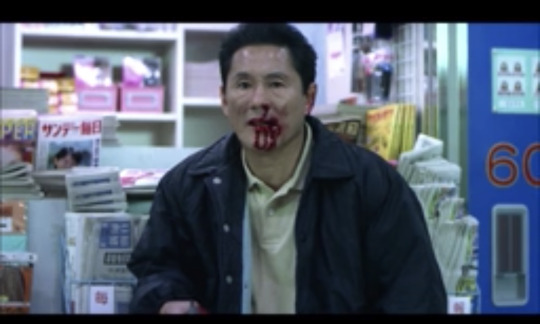
Some of my favorite scenes in this movie are when Nishi is having a flashback to the event where his partners were shot. It was interesting seeing when that happened and how it affected Nishi. You could tell from his actions that it was something that deeply affected his psyche. My favorite was when we got to watch Nishi shoot the guy that killed and maimed his partners. It was in slow motion, and you could see the surprise and pain on Nishi’s face. This scene was very hard to watch simply because we have only seen Nishi win up to this point. We know that he is an efficient violent machine. However, watching him fail so utterly and lose is very heartbreaking.
I think the point of this story is that people will do anything for the people they care about. Nishi went to great lengths to make sure that the people in his life could feel happy. It was interesting because you could tell throughout the movie that Nishi himself was not a happy man. However, helping his wife and Horibe probably brought him some joy. He was able to take care of the people he cared for. This movie ends with two gunshots. Presumably, it is Nishi killing himself and his wife. I think this is a strange end to a movie but not one that is surprising. Nishi knew that the cops were not o him and he knew that his wife would be passing away. In a sense, it was a final act of defiance to the circumstance they were put in. They got to die together on their terms.
1 note
·
View note
Text
'Hana-bi'
Hana-bi was such an interesting film to watch. The cinematography was beautiful. The pace of the film was purposefully and artistically slow, but the plot was so intense with everything happening that the film didn't actually feel slow.
I'm a bit uncertain of how to analyze this film in the context of Japanese society, because it really felt like a film that examined the philosophy of life that is universal to anyone around the world. While Nishi was the main character, Horibe was constantly juxtaposed after scenes of Nishi, encouraging the audience to see comparisons between them. While Nishi went out on an adventure with his wife, Horibe was bound at home because of his paralysis. Horibe's adventures were presented through the ideas and feelings being expressed in his art.
I interpreted the flower faces Horibe came up with in his mind as the emptiness of the beauty he used to have in his life. His paralysis along with his wife and child leaving him has left depressed and empty as he said he's never known anything other than work. He thinks about them and having family but flowers are placed in the faces because they are no longer there in his life.
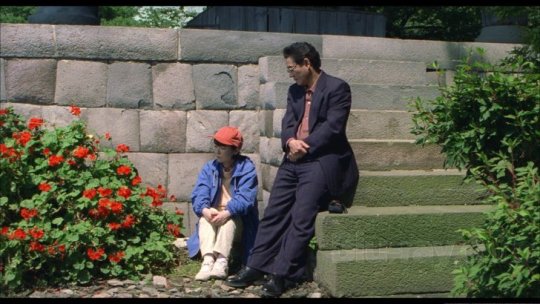
Fireworks to me seem like a beautiful grand explosion that is mesmerizing for a few seconds and disappears like nothing has ever been there before. I feel that Nishi chasing after adventures with his wife before she died was his way of setting a firework. Whereas Horibe's art is painting that is much more long-lasting, although it is not necessarily bringing him joy.
I also noticed that Nishi's wife never spoke until the end. It seems like she had really retreated from the world because of her illness and especially because of her child's death. Horibe mentioned at the beginning that she didn't say a word when he visited her at the hospital. However, I didn't realize that she wasn't speaking even to Nishi until close to the end. I liked that we got to know her through her games and places Nishi took her, because the silence allowed us to observe her and not focus on thinking about her illness or the fact that she is dying.
It felt to me that most people around Nishi seem to think they have a harder time than him. Moreover, they kept saying they didn't think anything was his fault but by saying that it implied that they were thinking he was part of the reason it happened. I think that kind of pressure and guilt would be too heavy for anyone to handle that I understand the painful outbreak Nishi had.
6 notes
·
View notes
Text
I also had to do some research after watching the film. I think the film did a great job at portraying specific circumstances and difficulties that could resonate with the general public, even beyond Japan, which is something very commendable.
Go - (JPT3391)
Yukisada’s Gois a coming of age story that attempts to expose the plight of Koreans living in Japan.
The movie sees Sugihara going through both a North Korean and later a Japanese high school, meeting various people and falling in love. It’s a well rounded coming of age story that follows a wide range of coming of age topics through the lens of Korean nationals in Japan. Sugihara faces quarrels with his parents, being a juvenile delinquent, making choices about his future and going to college. Sugihara sees a varied journey throughout the film.
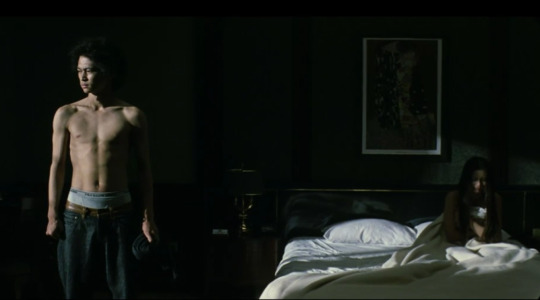
I had to google around more than usual this time, as I was completely unaware that North Korean schools would exist outside of North Korea, especially with how isolationist they treat themselves as. Digging into it however, apparently these schools were set up in the Korean War period as not everybody was able to or wanted to repatriate to the Korea they felt alignment with. These schools are taught in Korean, have unique curriculum from their Japanese counterparts. In the North Korean case, they also received substantial subsidies from the state to promote immigration to North Korea, although these subsidies have reduced in recent years down to nothing by the 2010s.
In Japan, these Korean who, for whatever reason, didn’t emigrate back to Korea have and continue to face discrimination in all aspects of society. One of the first ways this is shown to us, through Sugihara’s dad, who has presumably lived through the discrimination of being a Korean in Japan, and seeks to use citizenship – either to north or south Korea to create a sense of belonging and unlock opportunities, from travel to Hawaii to enrolling Sugihara in a Korean school to imbue him with a sense of belonging. However, this doesn’t work for Sugihara, the school seem to me to stifle him, he turns to delinquency with some friends and he doesn’t find belonging in his nationality there – where we see him and others feeling disinclined to use Korean because it’s not a natural language to them – they know Japanese. This draws a fine line under the unequal treatment Sugihara receives in the movie, because as far as I can tell, culturally he’s mostly Japanese and it’s just a tick-box on an ID card delineating him as Korean that causes the discrimination he faces. He faces this further from his girlfriend. In the film we see their initial relationship going very well – they have good chemistry and enjoy hanging out together, however the minute he reveals that he is of Korean descent, she recoils harshly and essentially cuts contact with him. Sugihara’s struggle with identity is also seen in his continual quarrel with his dad. At the core they both want Sugihara to have a fulfilling life and a sense of belonging in who he is, but due to different generational contexts their beliefs differ on the best way to achieve this, which is resolved to a point near the end when Sugihara decides to go to college
This movie was a really interesting case study on systematic discrimination in Japan through telling the story of Sugihara. It wasn’t the most fun movie I’ve watched this semseter but I think it addresses the issues it attempts to tackle admirably for it’s short runtime.
1 note
·
View note
Text
Go!
I really enjoyed this movie. It was a refreshing break coming back to stories of the youths that aren't absolutely gruesome and/or heart-wrenching.
I don't know if the existence of 'Zainichi' or Koreans in Japan was common knowledge, but I had no idea of their situation. It was so interesting to watch a more modern take on what international politics is like in Japan. It is also the first time we've seen non-Japanese characters take the lead in a Japanese film.
The topic of North Koreans in Japan is very interesting to me. I always think of North Korea as this place anyone would be happy to leave. I can't imagine never having access to the rest of the world and remaining loyal to your country after you've left it. It would have been less surprising if the schools were of South Koreans, but I simply didn't think North Koreans could ever stay loyal to North Korea after being exposed to the rest of the world. Wouldn't they feel like the government had deceived them all this time? I understand the need to connect to one's heritage by using their native language and engaging in one's own cultural practices, but the extent to which the North Koreans took their nationalism was much greater than I imagined it could be. The school forced their students to only speak in Japanese and encouraged them NOT to assimilate into Japanese society. This was mind boggling to me because I just kept thinking 'how could they not?'
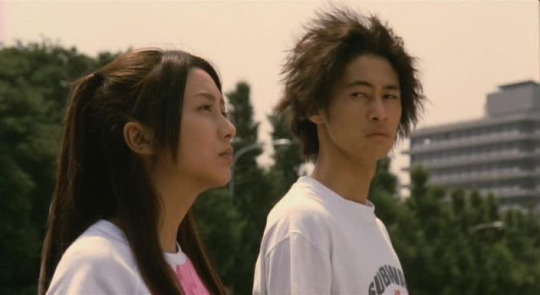
This is where Sugihara comes in. I don't believe he hates being Korean or that he is desperate to become fully Japanese, but he questions the whole ideology of identity in relation to nationality. His rebellious actions seem to come from a place of confusion rather than meaning any harm toward the people around him.
Sugihara represents the modern ideals of celebrating individuality and questioning the point of loyalty. He doesn't understand why he shouldn't be allowed to speak Japanese at school, switches up his nationality easily, and pleads to his girlfriend Sakurai to just see him as himself.
On some level I think the friend Jeong-Il who dies from a sudden attack represents the impossibility of North Korean assimilation into Japanese society. Jeong-Il still went to the North Korean school and had planned on working for North Koreans later on, but he also stood up for Sugihara when he was fighting the teacher. Whereas Sugihara wishes to be completely removed from both nationalities, Jeong-Il represents the bridge between both of them. His death signifies that bridging the two nationalities is impossible, at least at the time.
0 notes
Text
I really like the connection you made between this film and Seven Samurai. I didn’t notice the parallels until you mentioned it. I did notice the battle-like sequence and soundtrack that were used when Tampopo made the perfect ramen. I think it makes the scene comedic but also wholesome because it shows how much hard work is required to create such good food.
Tampopo
Food is such an important aspect of culture; it is a source of pride, a way to connect to people, and needed for survival. Tampopo reminds the audience how food is related to many aspects of our lives. It is simply inescapable. Food is also a defining quality of culture. In my family, holidays are celebrated through a feast. No matter what holiday, even Thanksgiving, we make dumplings. It is a way for my small family to spend time with each other, since we are all so busy usually.
I read a short summary of the movie beforehand, and it was referred to as “ramen western,” in reference to the Spaghetti Western genre. Though not about the American West, Goro still wears a cowboy hat, even in the bath. Tampopo faces her own battles as well. As she prepares the ramen near the end of the movie, the soundtrack utilizes timpani (I think), which is often utilized when showing battle preparations. An example I’m sure many people can recall is Evangelion’s “Decisive Battle.” Additionally, near the end Goro coolly walks away, like a cowboy. The way all the collaborators are recruited also reminded me of Seven Samurai. We have the leader, Goro, who is like Shimada. Similar to Shimada, Goro also uses personal connections to find people to help Tampopo, who is analogous to the village the samurai were protecting. There are also some coincidental happenings that led people to join the team. For example, Shimada witnesses a skilled swordsman who happened to be involved in a fight in the town they were at. He eventually recruits this samurai. In Tampopo, the group happens to save a rich man from choking, which allows them to recruit Shohei.
I also liked how the fourth wall was broken at the beginning of the film. It definitely scared me a little, since I was not expecting the character to address me directly, and then ask me what I was eating, especially since I was having dinner at the time. I also like how this character mentions a final film, which gets its payoff after he is shot several times. Just like in the beginning, this character hands off his hat to his lover and reminds her that he doesn’t want his final show to be interrupted with crying. I wonder if he knew about his impending death, and that’s why he mentions his own death, since he seems to know that he is in a film.
In addition to the main storyline about Tampopo, we see several unrelated scenes that involve food. I think these scenes convey how universal of a subject it is. We see food etiquette from foreign countries, in familial love, and in sex. These subjects don’t seem related at all on a surface level, but this film shows that they are by conveying how food is used in everything.
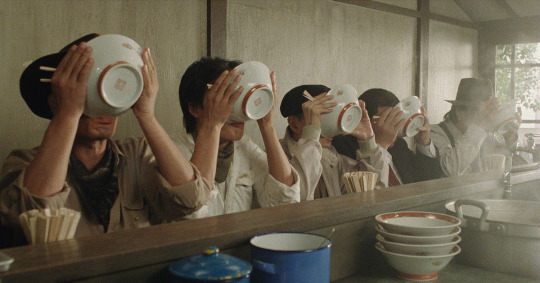
This scene also reminds me of the funeral scene in Tokyo Story, with the characters all lined up. This scene was a lot happier though.
3 notes
·
View notes